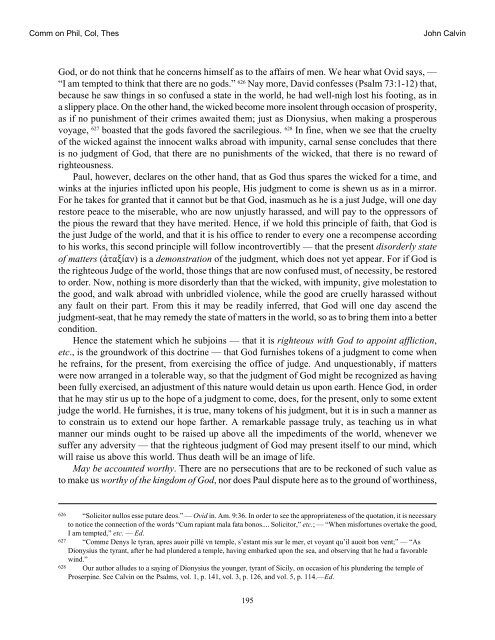Commentary on Philippians, Colossians, and Thessalonians
Commentary on Philippians, Colossians, and Thessalonians
Commentary on Philippians, Colossians, and Thessalonians
You also want an ePaper? Increase the reach of your titles
YUMPU automatically turns print PDFs into web optimized ePapers that Google loves.
Comm <strong>on</strong> Phil, Col, Thes<br />
God, or do not think that he c<strong>on</strong>cerns himself as to the affairs of men. We hear what Ovid says, —<br />
“I am tempted to think that there are no gods.” 626 Nay more, David c<strong>on</strong>fesses (Psalm 73:1-12) that,<br />
because he saw things in so c<strong>on</strong>fused a state in the world, he had well-nigh lost his footing, as in<br />
a slippery place. On the other h<strong>and</strong>, the wicked become more insolent through occasi<strong>on</strong> of prosperity,<br />
as if no punishment of their crimes awaited them; just as Di<strong>on</strong>ysius, when making a prosperous<br />
voyage, 627 boasted that the gods favored the sacrilegious. 628 In fine, when we see that the cruelty<br />
of the wicked against the innocent walks abroad with impunity, carnal sense c<strong>on</strong>cludes that there<br />
is no judgment of God, that there are no punishments of the wicked, that there is no reward of<br />
righteousness.<br />
Paul, however, declares <strong>on</strong> the other h<strong>and</strong>, that as God thus spares the wicked for a time, <strong>and</strong><br />
winks at the injuries inflicted up<strong>on</strong> his people, His judgment to come is shewn us as in a mirror.<br />
For he takes for granted that it cannot but be that God, inasmuch as he is a just Judge, will <strong>on</strong>e day<br />
restore peace to the miserable, who are now unjustly harassed, <strong>and</strong> will pay to the oppressors of<br />
the pious the reward that they have merited. Hence, if we hold this principle of faith, that God is<br />
the just Judge of the world, <strong>and</strong> that it is his office to render to every <strong>on</strong>e a recompense according<br />
to his works, this sec<strong>on</strong>d principle will follow inc<strong>on</strong>trovertibly — that the present disorderly state<br />
of matters (ἀταξίαν) is a dem<strong>on</strong>strati<strong>on</strong> of the judgment, which does not yet appear. For if God is<br />
the righteous Judge of the world, those things that are now c<strong>on</strong>fused must, of necessity, be restored<br />
to order. Now, nothing is more disorderly than that the wicked, with impunity, give molestati<strong>on</strong> to<br />
the good, <strong>and</strong> walk abroad with unbridled violence, while the good are cruelly harassed without<br />
any fault <strong>on</strong> their part. From this it may be readily inferred, that God will <strong>on</strong>e day ascend the<br />
judgment-seat, that he may remedy the state of matters in the world, so as to bring them into a better<br />
c<strong>on</strong>diti<strong>on</strong>.<br />
Hence the statement which he subjoins — that it is righteous with God to appoint afflicti<strong>on</strong>,<br />
etc., is the groundwork of this doctrine — that God furnishes tokens of a judgment to come when<br />
he refrains, for the present, from exercising the office of judge. And unquesti<strong>on</strong>ably, if matters<br />
were now arranged in a tolerable way, so that the judgment of God might be recognized as having<br />
been fully exercised, an adjustment of this nature would detain us up<strong>on</strong> earth. Hence God, in order<br />
that he may stir us up to the hope of a judgment to come, does, for the present, <strong>on</strong>ly to some extent<br />
judge the world. He furnishes, it is true, many tokens of his judgment, but it is in such a manner as<br />
to c<strong>on</strong>strain us to extend our hope farther. A remarkable passage truly, as teaching us in what<br />
manner our minds ought to be raised up above all the impediments of the world, whenever we<br />
suffer any adversity — that the righteous judgment of God may present itself to our mind, which<br />
will raise us above this world. Thus death will be an image of life.<br />
May be accounted worthy. There are no persecuti<strong>on</strong>s that are to be reck<strong>on</strong>ed of such value as<br />
to make us worthy of the kingdom of God, nor does Paul dispute here as to the ground of worthiness,<br />
626 “Solicitor nullos esse putare deos.” — Ovid in. Am. 9:36. In order to see the appropriateness of the quotati<strong>on</strong>, it is necessary<br />
to notice the c<strong>on</strong>necti<strong>on</strong> of the words “Cum rapiant mala fata b<strong>on</strong>os.... Solicitor,” etc.; — “When misfortunes overtake the good,<br />
I am tempted,” etc. — Ed.<br />
627 “Comme Denys le tyran, apres auoir pillé vn temple, s’estant mis sur le mer, et voyant qu’il auoit b<strong>on</strong> vent;” — “As<br />
Di<strong>on</strong>ysius the tyrant, after he had plundered a temple, having embarked up<strong>on</strong> the sea, <strong>and</strong> observing that he had a favorable<br />
wind.”<br />
628 Our author alludes to a saying of Di<strong>on</strong>ysius the younger, tyrant of Sicily, <strong>on</strong> occasi<strong>on</strong> of his plundering the temple of<br />
Proserpine. See Calvin <strong>on</strong> the Psalms, vol. 1, p. 141, vol. 3, p. 126, <strong>and</strong> vol. 5, p. 114.—Ed.<br />
195<br />
John Calvin















